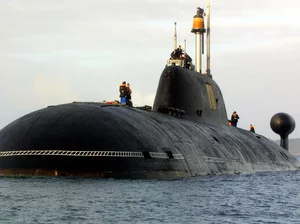India’s ambitious ambition to construct six next-generation conventional submarines is still in limbo, and on Monday Russia warned that the project will fail without “dramatic revisions” to the Indian Navy’s Project 75 India (P75I) tender.
Russia also made the point that no naval force in the world possesses the kind of submarines that India is looking for, thus the ships must be created from scratch.
“The first country to abandon the project was Sweden. Germany came next, and now France. Andrey Baranov, deputy director general, Foreign Economic Activities at the Rubin Design Bureau, Russia’s state-owned submarine designers, responded to a question from ThePrint by saying, “We are also not participating.
At the Army 2022 defence expo in Moscow, Baranov was giving a speech.
ThePrint previously reported that the P75I, which is being pursued under “Strategic Partnership” and is intended to be built in India through a partnership between a foreign Original Equipment Manufacturer (OEM) and an Indian entity, is still in limbo because a number of foreign companies have decided to stay away.
The OEMs up for grabs were South Korea’s Daewoo Shipbuilding & Marine Engineering, Germany’s ThyssenKrupp Marine Systems, France’s Naval Group, Spain’s Navantia, Russia’s Rosoboronexport Rubin Design Bureau, and Swedish company SAAB.
Prior to a formal tender being released in 2019, SAAB was the first to withdraw, citing “unbalance” in a strategic alliance.
‘No naval force has such submarines’
In 2008, according to Baranov, his office received the initial papers from India for the P75I project.
“You can check how long it has been since the last Request for Proposal (RFP) was released. Therefore, we believe that a complete book can be written about Russian involvement in P75I,” he stated.
According to Baranov, the main issue for Russia is the discrepancy between the Indian Navy’s deadlines and the requirements it has set forth.
The Indian Navy desires a cutting-edge submarine with AIP (Air Independent Propulsion), potent weaponry, and extremely high stealth. There isn’t a prototype of a submarine like this in any of the world’s navies. We’re discussing the creation of a completely original product,” he stated.
Baranov emphasised that the Rubin Design Bureau has been creating ships and submarines for 120 years and stated that building the first ship is always the toughest task. Additionally, he noted that such difficulties are a normal part of the growth of complex systems and that it will take time to construct the first ship under P75I.
But the RFP’s (request for proposals) specifications call for an extremely constrained timeline. And the designer is given a lot of responsibilities. In addition, the designer has little control over the Indian construction process, according to him.
The main stipulation (in the RFP) is that submarines must be built in India, Baranov continued. The cost of missing deadlines is very substantial. We have said from the beginning that building the first submarine in such a short period of time is not feasible. An RFP was released without taking into account this issue. Russia therefore alerted the Indian Navy of its disinterest in taking part.
The senior Russian defence source added that the French, Germans, and Swedes have also voiced similar worries, in addition to Russians.
According to information obtained, the Indian Navy expects the first submarine to be delivered within five years of the contract’s signature. This request will be carried out through a strategic partnership.
“So the submarine concept was extremely good, but the Make in India implementation approach was not good. So that’s why nothing is happening at the moment. And without making any significant adjustments to the procedure, I believe nothing will happen,” he added.
‘Many systems not tested in India yet’
Many of the technologies, including AIPs, propulsion motors, and others, that India wants to integrate with its submarines have not yet been produced or tested in India, according to a senior Russian defence official.
Due to the weak response to the RFP, the Indian Navy decided to move the deadline for proposal submission from the previously extended period of June end to the end of this year.
The foreign corporations requested that the strategic partnership be modified and that the requirement for an in-service AIP system be dropped. The Navy’s grandiose 30-year submarine plan has stalled and is far off course.
India was supposed to construct 24 submarines as a powerful deterrent against China and Pakistan under the ambitious 30-year-old plan that expires in 2030. There would be 18 conventional and six nuclear-powered SSNs.
